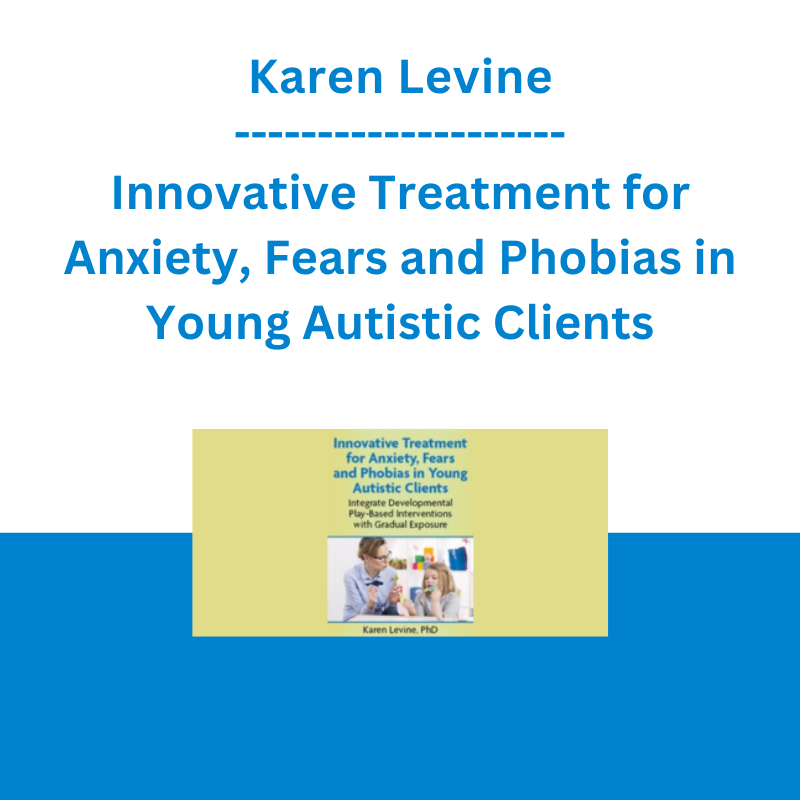*** Proof of Product ***
Exploring the Essential Features of “Karen Levine – Innovative Treatment for Anxiety, Fears and Phobias in Young Autistic Clients: Integrate Developmental Play-Based Interventions with Gradual Exposure”
Speaker:Karen Levine, PhD
Duration:1 Hour 50 Minutes
Format:Audio and Video
Copyright:Apr 18, 2024
Description
Elevate your therapeutic toolkit with a powerful workshop led by Karen Levine, PhD, addressing the surge in anxiety-related fears and phobias among autistic children.
Join us as Dr. Levine guides you through a groundbreaking treatment model that seamlessly integrates developmental play-based interventions with gradual exposure—an approach designed to revolutionize your practice. Although gradual exposure by itself is stress inducing for autistic individuals, when paired with play and humor it becomes a non-distressing technique that ‘unbundles’ phobias, breaking them down into isolated components for more tolerable exposure.
Learn how to engage your young autistic clients through enjoyable and individualized interactions that will address their fears and the source thereof—using humor and adjusting exposure based on their affect. This innovative, research-backed model promotes co-regulation and fosters sustained well-being in the child!
Don’t miss this exclusive opportunity to reshape your therapeutic approach! Register today for impactful interventions!
Speaker
Karen Levine, PhD
Karen Levine, PhD, is a psychologist in private practice in Maine and Massachusetts, and a part-time lecturer on psychiatry at Harvard Medical School. She was the co-founder and co-director of the Autism program at Boston Children’s Hospital in the late 1990s, and later of the Autism Center at Cambridge Health Alliance.
Dr. Levine works primarily with young children and their parents, including neurotypical and neurodivergent children, with a special focus on treating anxiety. She developed a treatment model integrating gradual exposure (a key part of Cognitive Behavioral Therapy) and playful attuned interactive humor, to treat fears and phobias in young children. This approach is currently being studied and manualized by Bonnie Klein-Tasman, PhD and her research team at University of Wisconsin-Milwaukee, with promising initial published findings.
With Naomi Chedd, LMHC, Dr. Levine has co-authored three books including Attacking Anxiety: A Step-by-Step Guide to an Engaging Approach to treating Anxiety and Phobias in Children with Autism and Other Developmental Disabilities (JKP, 2015) and many articles. She received the 2012 Lesley University Autism Heroes Award, the 2010 Federation for Children with Special Needs Founders Award, and the 2000 BIDIP (Boston Institute for the Development of Infants and Parents) Award for Excellence.
Speaker Disclosures:
Financial: Dr. Karen Levine maintains a private practice and has an employment relationship with Harvard Medical School. She receives royalties as a published author. Dr. Levine receives a speaking honorarium and recording royalties from PESI, Inc. She has no relevant financial relationships with ineligible organizations.
Non-financial: Dr, Karen Levine has no relevant non-financial relationships.
Objectives
- Utilize a new model for treating fears and phobias in children not able to access traditional Cognitive Behavioral Therapy
- Assess the child’s affective state (e.g., happy; scared) to guide the therapeutic process up and down the child’s ‘fear ladder’
- Utilize ‘unbundling’ to design accessible steps of gradual exposure that help the child become comfortable with multiple sensory and affective components of their fear
- Design individualized, child specific humor and playfulness for use in gradual exposure therapy sessions
Outline
Unpacking Anxiety, Fears and Phobias in Autistic Children
- Neurotypical vs neurodivergent children
- Developmental functions of social engagement, communication and pretend play
- How the experience of anxiety and phobias impacts social engagement
Developmental Relationship-Based Interventions with Gradual Exposure to Treat Anxiety, Fears and Phobias in Autistic Children
Video Examples and Specific How-Tos
- Create an individualized humor and play-based treatment plan
- Assess affective state to guide the therapeutic process up and down the child’s ‘fear ladder’
- Importance of awareness of cultural and individual differences around humor
- Research supporting this model
- What if it doesn’t work? Limitations of this model
Target Audience
- Counselors
- Education professionals
- Marriage and Family Therapists
- Occupational Therapists
- Psychologist
- Physicians
- Physical Therapists
- Speech-Language Therapists
- Social Workers
Please see the full list of alternative group-buy courses available here: https://lunacourse.com/shop/









